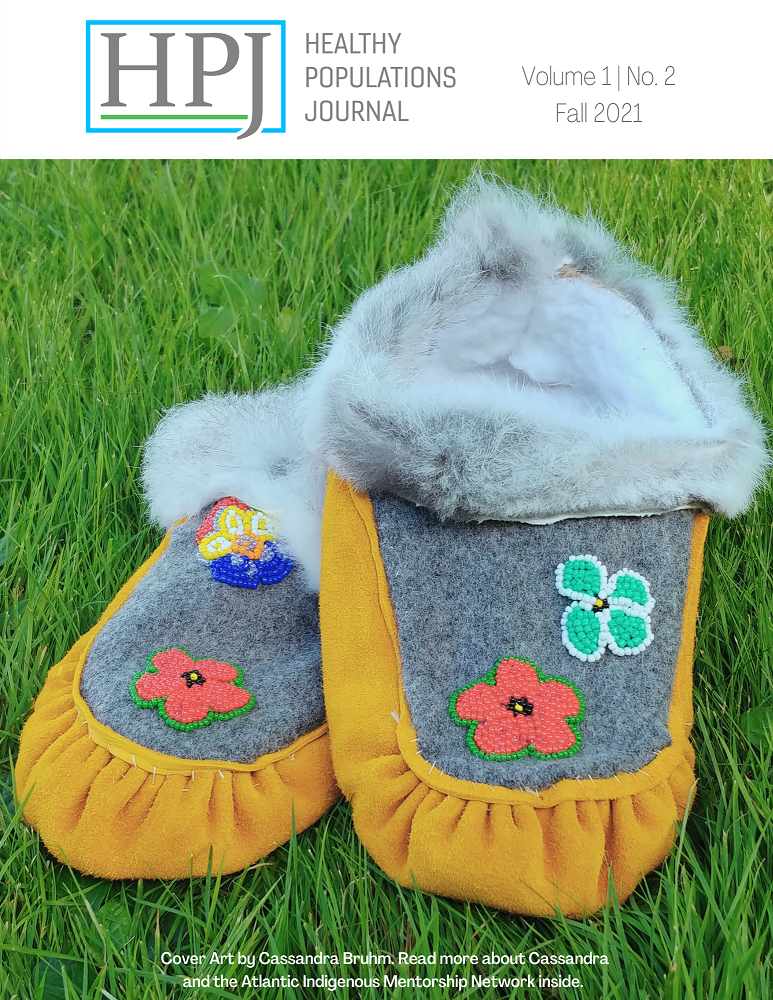A Qualitative Case Study Exploring the Experiences of Caregivers Using a Patient Navigation Centre for Children with Complex Care Needs
DOI:
https://doi.org/10.15273/hpj.v1i2.10653Аннотация
Introduction: Approximately 15% of children in North America live with a complex health condition. When caring for these children, it can be difficult and time-consuming to determine what services are available to meet their complex needs. Method: The aim of this research project was to explore the experiences of families using NaviCare/SoinsNavi, a patient navigation centre for children/youth with complex care needs and their families. Six families were assessed longitudinally over a six- to eight-month period. Semi-structured interviews were done at intake, three to five months, and six to eight months. Families also kept a monthly diary recording their experiences. Results: Families were satisfied with the services provided by NaviCare/SoinsNavi. They found it comforting to have someone that would take the time to listen to their concerns and was able to provide recommendations for services. Discussion: This longitudinal case study shows the benefit of navigation centres for children/youth with complex care needs and their families.
Библиографические ссылки
American Academy of Pediatrics Council on Children with Disabilities. (2005). Care coordination in the medical home: Integrating health and related systems of care for children with special health care needs. Pediatrics, 116(5), 1238–1244. https://doi.org/10.1542/peds.2005-2070
Bolger, N., Davis, A., & Rafaeli, E. (2003). Diary methods: Capturing life as it is lived. Annual Review of Psychology, 54, 579–616. https://doi.org/10.1146/annurev.psych.54.101601.145030
Braun, V., & Clarke, V. (2006). Using thematic analysis in psychology. Qualitative Research in Psychology, 3(2), 77–101. https://psycnet.apa.org/doi/10.1191/1478088706qp063oa
Brenner, M., Kidston, C., Hilliard, C., Coyne, I., Eustace-Cook, J., Doyle, C., Begley, T., & Barrett, M. J. (2018). Children‘s complex care needs: A systematic concept analysis of multidisciplinary language. European Journal of Pediatrics, 177(11), 1641–1652. https://doi.org/10.1007/s00431-018-3216-9
Caicedo, C. (2014). Families with special needs children: Family health, functioning, and care burden. Journal of the American Psychiatric Nurses Association, 20(6), 398–407. https://doi.org/10.1177%2F1078390314561326
Charlton, P., Azar, R., Luke, A., Doucet, S., Montelpare, W., Nagel, D., Hyndman, N., & Thompson, K. (2017). Falling through the cracks: Barriers to accessing services for children with complex health conditions and their families in New Brunswick. Journal of New Brunswick Studies / Revue D‘études Sur Le Nouveau-Brunswick, 8, 133–158. https://journals.lib.unb.ca/index.php/JNBS/article/view/25883
Colver, A. F., Merrick, H., Deverill, M., Le Couteur, A., Parr, J., Pearce, M. S., Rapley, T., Vale, L., Watson, R., & McConachie, H. (2013). Study protocol: Longitudinal study of the transition of young people with complex health needs from child to adult health services. BMC Public Health, 13, Article 675. https://doi.org/10.1186/1471-2458-13-675
Doucet, S., Luke, A., Splane, J., & Azar, R. (2019). Patient navigation as an approach to improve the integration of care: The case of NaviCare/SoinsNavi. International Journal of Integrated Care, 19(4), Article 7. http://doi.org/10.5334/ijic.4648
Doucet, S., Nagel, D. A., Azar, R., Montelpare, W. J., Charlton, P., Hyndman, N., Luke, A., & Stoddard, R. (2017). A mixed-methods Quick Strike research protocol to learn about children with complex health conditions and their families. International Journal of Qualitative Methods, 16(1). https://doi.org/10.1177%2F1609406917731426
Ellenwood, A. E., & Jenkins, J. E. (2007). Unbalancing the effects of chronic illness: Non-traditional family therapy assessment and intervention approach. The American Journal of Family Therapy, 35(3), 265–277. https://doi.org/10.1080/01926180600968431
Fillion, L., Cook, S., Veillette, A. M., Aubin, M., de Serres, M., Rainville, F., Fitch, M., & Doll, R. (2012). Professional navigation framework: Elaboration and validation in a Canadian context. Oncology Nursing Forum, 39(1), E58–69. https://doi.org/10.1188/12.onf.e58-e69
Freeman, H. P., & Rodriguez, R. L. (2011). History and principles of patient navigation. Cancer, 117(S15), 3539–3542. https://doi.org/10.1002/cncr.26262
Gotlib Conn, L., Hammond Mobilio, M., Rotstein, O. D., & Blacker, S. (2016). Cancer patient experience with navigation service in an urban hospital setting: A qualitative study. European Journal of Cancer Care, 25(1), 132–140. https://doi.org/10.1111/ecc.12247
Kaufman, M., Pinzon, J., Canadian Paediatric Society, & Adolescent Health Committee. (2007). Transition to adult care for youth with special health care needs. Paediatrics & Child Health, 12(9), 785–788. https://doi.org/10.1093/pch/12.9.785
King, G., Williams, L., & Hahn Goldberg, S. (2017). Family-oriented services in pediatric rehabilitation: A scoping review and framework to promote parent and family wellness. Child: Care, Health and Development, 43(3), 334–347. https://doi.org/10.1111/cch.12435
Luke, A., Luck, K. E., & Doucet, S. (2020). Experiences of caregivers as clients of a patient navigation program for children and youth with complex care needs: A qualitative descriptive study. International Journal of Integrated Care, 20(4), Article 10. http://doi.org/10.5334/ijic.5451
McMullen, L. (2013). Oncology nurse navigators and the continuum of cancer care. Seminars in Oncology Nursing, 29(2), 105–117. https://doi.org/10.1016/j.soncn.2013.02.005
Paskett, E. D., Harrop, J. P., & Wells, K. J. (2011). Patient navigation: An update on the state of the science. CA: A Cancer Journal for Clinicians, 61(4), 237–249. https://doi.org/10.3322/caac.20111
Valaitis, R. K., Carter, N., Lam, A., Nicholl, J., Feather, J., & Cleghorn, L. (2017). Implementation and maintenance of patient navigation programs linking primary care with community-based health and social services: A scoping literature review. BMC Health Services Research, 17, Article 116. https://doi.org/10.1186/s12913-017-2046-1
Weinhold, I., & Gurtner, S. (2014). Understanding shortages of sufficient health care in rural areas. Health Policy (Amsterdam, Netherlands), 118(2), 201–214. https://doi.org/10.1016/j.healthpol.2014.07.018
Yin, R. K. (2014). Case study research: Design and methods (5th ed.). Sage Publication.


